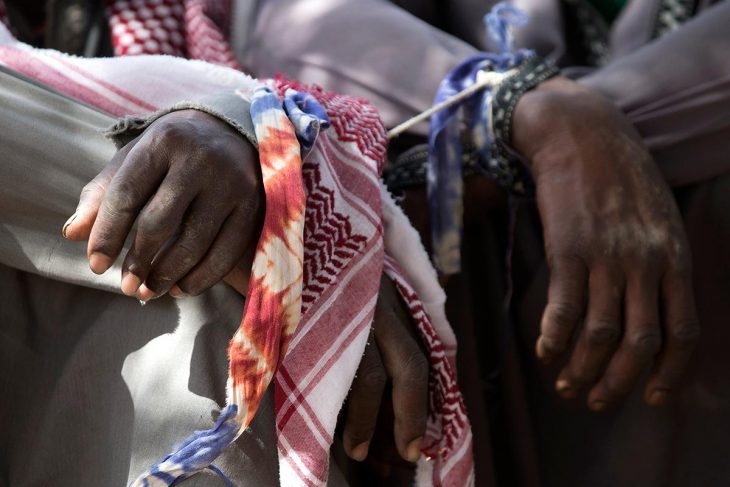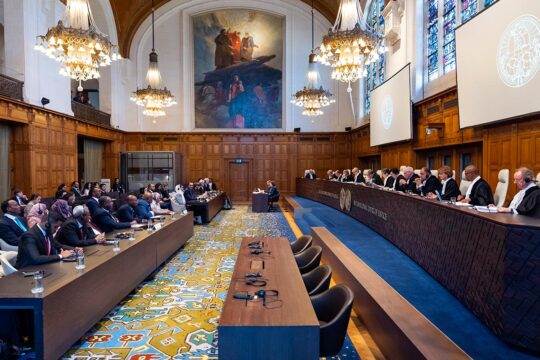Will the victims have the courage to tell their compatriots and the world what they have experienced? Will the members of the Truth, Justice and Reconciliation Commission (TJRC) be up to the task of carrying out this delicate and unprecedented exercise in Mali? How will Malians react to these stories, which will bring to life painful moments in a history marked by crises and serious human rights violations ever since Mali gained its independence from France in 1960?
The stories that will be heard this Sunday December 8 in the capital Bamako during the very first public hearing of the TJRC are a test for the country. "It is in fact a pilot hearing, from which lessons will be drawn for the subsequent hearings" scheduled for next year, explains TJRC legal advisor Antoine Stomboli of Avocats sans Frontières-Canada, which is providing technical assistance and a financial contribution in support of the Commission.
No confrontation between victims and perpetrators
At a press conference on 3 December in Bamako, TJRC president Ousmane Oumarou Sidibé explained the objectives of these hearings and how they would work. "In our case, unlike in other countries, public hearings are not intended to confront victims and perpetrators; they are not intended to grant an amnesty because it is prohibited by the peace agreement, which excludes amnesty for serious human rights violations such as war crimes and crimes against humanity,” he said. “Nor are they judicial hearings. They are hearings that aim to restore dignity to victims, to facilitate the beginning of healing; they are a great moment of public recognition of what victims have suffered.” According to Sidibé, they will make it possible to bring the victims' stories into "national history and to use this information as an educational tool in a spirit of non-repetition".
Five more hearings in 2020
The TJRC has announced it wants to hold six public hearings on different themes. This first hearing will focus on "violations of the right to freedom", according to the TJRC president. This means that victims and witnesses of arbitrary arrests, detentions and kidnappings will be heard. The other five public hearings are scheduled to be held next year. The themes selected are: violations of the right to life and physical integrity (murder, inhuman and degrading treatment); enforced disappearances; violations of the right to property (looting and ransacking of property); violence against children; and violence against women.
All these hearings will be held in the Malian capital, before a panel of six commissioners, including at least two women. Each session will last only one day, during which between eight and ten witnesses will be heard. Witnesses may be accompanied by a friend, legal representative or family member of their choice. A TJRC expert or psychologist will also be available to support the victim during his or her testimony.
The selection of victims
"What we expect of these public hearings is that the truth be known so that victims can find reparation. Women have been raped, others rejected by society," Haidara Aminai Maiga, president of the National Council of Victims, told Studio Tamani, a radio production studio. For her, reparation is not only financial. It can be individual or collective or consist of psychological support. The very fact of being listened to is a relief, according to Maiga, who says victims are ready to forgive.
"The main concern of victims remains reparation," says teacher and researcher Aly Tounkara in an interview with JusticeInfo. However, this security specialist regrets that some victims have not been included in the process. He says some victims in rural areas feel excluded. "The establishment of the Commission was welcomed by all Malians. But there are problems with victim identification," he told JusticeInfo.
Creating clans?
Mody Samba Touré, president of the Malian Coordination of Civilian Victims' Organizations, is one of those who claim to be excluded. "The TJRC has not organized these public hearings with the real victims," he asserts, accusing the Commission of "creating clans" among the victims. "These hearings should have been prepared with all the victims' associations, but neither I nor my organization were invited," adds this former trade unionist known for his criticism of the TJRC.
This phase of the public hearings has been postponed several times and begins after the government decided on 20 September to extend the duration of the Commission until December 2021 and to extend the period covered by its investigations until the end of 2019. The TJRC was created in 2014 for a three-year term and its mandate initially covered the period from independence in 1960 to 2013. According to TJRC commissioner Ibrahim Coulibaly, this extension will allow the institution, accused of slowness, to take into account the maximum number of victims, particularly in certain parts of the country that are still in a state of insecurity.
The coordinator of the Malian Human Rights Association (AMDH), Drissa Traoré, agrees. "It made sense to extend temporal jurisdiction, as many crimes were still being committed after 2013. We must not exclude these victims, deprive them of the right to reparations, to know the truth," he says.
More than 15,000 testimonies
Defending the results of its first mandate, the TJRC says it has so far been able to collect more than 15,000 testimonies, despite the fact that its deployment in some regions has been delayed due to insecurity. It also notes with satisfaction that it has prepared a preliminary draft of a reparation policy, which has yet to be submitted to parliament. But this does not convince Mody Samba Touré, for whom "the TJRC is a political commission that does not meet the aspirations of the victims".
Ramata Guissé, Executive Director of Amnesty International in Mali, agrees that victims in more remote parts of Mali have difficulty accessing the TJRC, but says "the work done by the Commission has some positive points". She cites in particular "the creation of the Commission's branches in the regional capitals and the building of victims' trust, a very important factor without which there would not have been any testimonies".
"Sunday will allow us to judge whether the TJRC really wants to help Malians move forward or whether it is being somehow manipulated,” says one local journalist who did not wish to be named.






